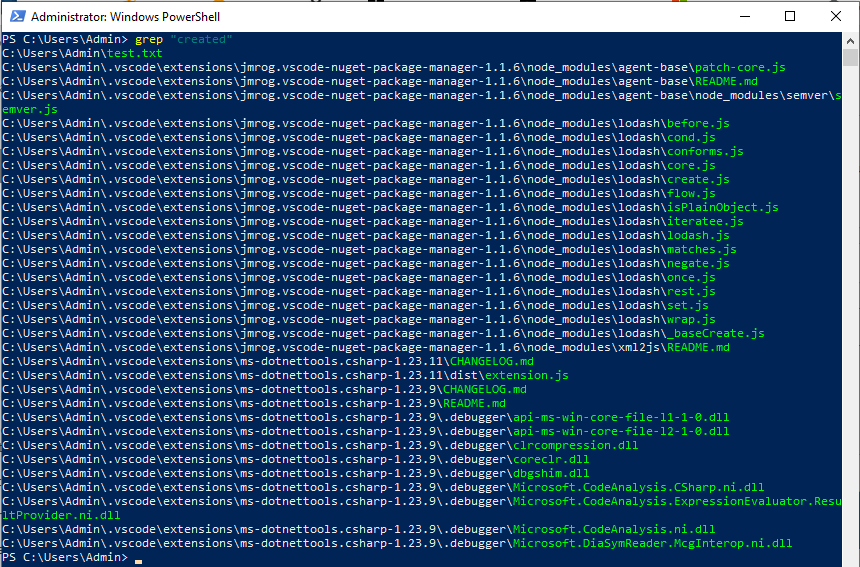

Printf 'Hello World Cpp\n' > my-second-dir/my-script.cpp Matches all lines in '.txt' files containing pattern1, but not pattern2. You can make use of grep along with pipe to grep for term and exclude another.

The -v (or -invert-match) option filters out matches.
#Grep exclude pattern command code
printf 'Hello World Go\n' > my-first-dir/my-script.go Anyway, yours is the fastest way that I found to do grep -R in several code files using Ubuntu command line. To understand this part, let’s create different files with different extensions. This option is described as “skip files matching PATTERN”. To exclude files we will be using the -exclude=PATTERN option.
#Grep exclude pattern command how to
Note that this query will exclude all directories that match the following pattern Excluding Files With GrepĪfter we’ve seen how to exclude specific directories and printing non-matching lines, we have check the last item in our article skipping specific files while searching with grep. Let’s type a grep query that excludes our second set of folders: grep -R -exclude-dir=*folder : Bracket expression: Matches a single character or range of characters.+ : The preceding item is matched one or more times.* : The preceding item is matched zero or more times.? : The preceding item is optional and is matched at most once.For this example we will be using this special character * to exclude directories.Ĭheck some other regular expressions below: The only solution to this is using regular expressions. We could achieve that by following one of the above methods, but that would be time consuming and tedious. Now we want to search only the files in the first set of directories by excluding the second set of directories. The second set has a different naming syntax: 1folder, 2folder… 100folder. Suppose that you have a large number of folders, the first set has the following naming syntax: folder1, folder 2 … folder100. Output my-third-dir/my-lines3.txt:hunting Let’s start by creating our new testing directory and. To fully understand this topic, we are going to take a step-by-step approach. We can use this action by including the -v flag. In grep we call this feature an invert match or negative result, which matches everything except the pattern given. -exclude-dir= : ignore directories that match the pattern.-exclude= : ignore files that match the pattern.-R : search recursively but follow all symlinks.is there for completeness and does not do anything except it overrides -h given earlier on the command line. -E : interpret patterns as extended regular expressions git-grep - Print lines matching a pattern.In other simpler words, you can find stuff with grep or you can choose to ignore them.

The search process of this program is very efficient even when dealing with a wide scoop of directories/files, grep does not store any lines it copies a line into a buffer, check for the search string, then print the line if a match was found.ĭespite the fact that searching for a given string is the objective of this tool, one of its features is excluding lines that match the given search string from the output while recurring through the directory tree. We can achieve this by utilizing a wide range of command line options (flag keywords) and Regular Expressions patterns. Surprisingly this simple tool is by far one of the most useful command line tools in Linux it provides various additional and useful features that make the search queries less time consuming and more effective. Grep or global regular expression print is a command line utility to search input files for a search string and returns the matching lines it searches through either information piped to it or files in the current directory. usr/bin/time grep -i -E "(loginmanager)" /var/log/tomcat/tomcat.log.1 | grep -v -e "login OK" -e "Login expired" | wcĢ3.08user 0.14system 0:23.55elapsed 98%CPU (0avgtext+0avgdata 3504maxresident)kĢ3.50user 0.15system 0:25.In this article we’ll learn about with a wide range of features to exclude directories, skipping files and selecting non-matching results while searching files with grep. usr/bin/time grep -i -E "(loginmanager)" /var/log/tomcat/tomcat.log.1 | sed -e "/login OK/d" -e "/Login expired/d" | wcĢ4.05user 0.15system 0:25.27elapsed 95%CPU (0avgtext+0avgdata 3504maxresident)kĠinputs+0outputs (0major+246minor)pagefaults 0swapsĢ3.50user 0.16system 0:24.48elapsed 96%CPU (0avgtext+0avgdata 3504maxresident)k

So I am going to use sed as I combine quite a number of filters on sed. -excludeGLOB Skip any command-line file with a name suffix that matches the pattern GLOB, using wildcard matching a name. Sed has some other useful text replacement features which I often use to better filter the out put of log files. From my experiments it does not seam to make much difference if you pipe your exclude terms


 0 kommentar(er)
0 kommentar(er)
